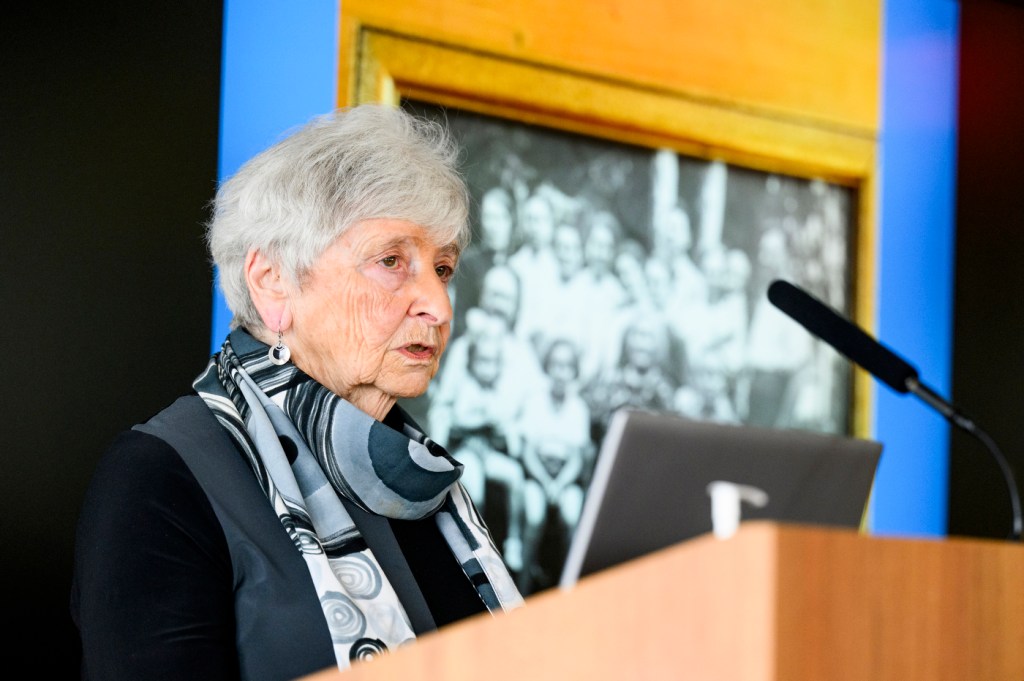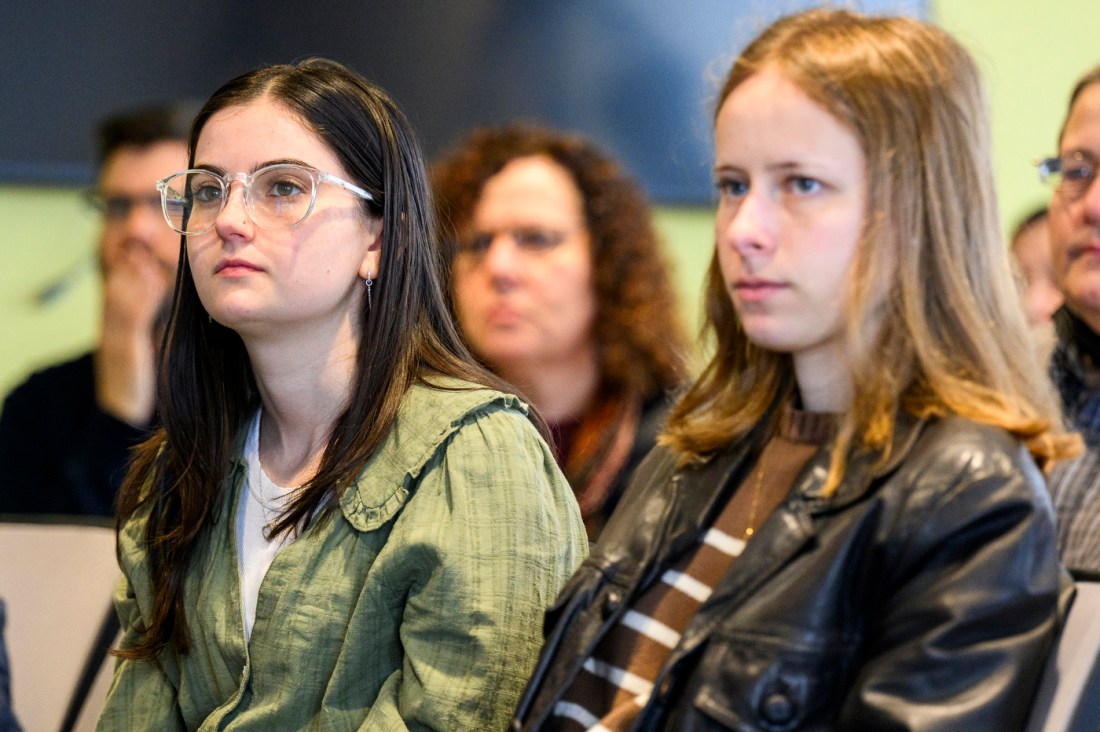Czech Kindertransport survivor shares the story of how she escaped the Holocaust

In July 1939, Eva Paddock was 3½ years old and, along with her sister, boarded a train that would take her from Prague to England, saving them from the Holocaust.
It was the last of the Czech Kindertransport trains.
“While I consider my story important to tell for its documentation of events which might otherwise be forgotten, it’s for me primarily a story of altruism, of love and of courage,” Paddock said in a lecture on Northeastern University’s Boston campus Wednesday. “I too am committed to keeping memory alive as long as I’m able to undermine the attempts of those who would deny the Holocaust and rewrite history.”
Paddock was the guest speaker at the Philip N. Backstrom Jr. Survivor Lecture. The event was part of Northeastern’s annual Holocaust and Genocide Awareness Week, and was presented by the Holocaust and Genocide Awareness Committee, the College of Social Sciences and Humanities, the Jewish Studies Program, and the Humanities Center.

Paddock’s story was heartbreaking, sometimes amusing despite the backdrop — her politician father engineered a scheme for Thomas Mann to be named an honorary citizen of the village where he sat on the local council, enabling the exiled German writer to obtain Czech citizenship and escape to the United States — and poignant, revealing the best and worst of humankind.
It was also illustrated with artifacts — family portraits, messages from relatives and official papers documenting the story.
“These are important documents for people who would dare suggest these things didn’t happen,” Paddock said.
Paddock was born in Czechoslovakia in 1935 to Sonia, a physician, and Rudolf Fleischmann, who worked as an editor and political activist. The family was a typical, upper-middle class, secular Jewish family, Paddock said.
But her early years were in a time of “radical antisemitism” in Czechoslovakia and Europe coinciding with the rise of the Nazi Party in Germany, Paddock said, and Prague was turning into a refuge for people hoping to escape war.
Paddock’s family members were among those hoping to escape as the Germans approached.
Her father — “a man with chutzpah and a creative mind,” as Paddock described him — was told to leave immediately. So, Fleischmann decided to go to Berlin, thinking it would be the last place someone would look for him, and eventually on to safety in London, Paddock said.
It was on the trip that humanity shone through.
On the train to the German capital, Fleischmann confided in a young woman who was also trying to escape the notice of authorities (in her case, smuggling farm produce across borders). The woman gave Fleischmann a place to stay overnight in Berlin, and said her brother could help him escape. Late that night, there was a knock at the door — but instead of the woman’s brother, it was an SS officer named Joachim Schreiber.
Featured Posts
Rather than being arrested, however, Fleischmann was advised to give the German salute “thoroughly and with conviction” whenever asked, Paddock said. Schreiber also told authorities that Fleischmann was an important person who was not to be disturbed and no one was allowed to enter his compartment on the next leg of his trip to Brussels.
Then at the Brussels airport, humanity came through again.
Fleischmann was told the money he had brought was unacceptable, due to it being from an occupied territory, Paddock said. The man behind him in line — named Buggenhout — paid for Fleischmann’s ticket.
Meanwhile, Paddock’s mother had heard about a British banker in Prague named Nicholas Winton who could get children to England and place them with foster families.
“People came in the hundreds to register children,” Paddock said, showing the photograph that was attached to her registration.
Between March and September 1939, 669 children traveled from Prague to safety in England. Eva and her sister Milena were placed with the Radcliffe family — who came to be known as “Mommy and Daddy Radcliffe.”
Daddy Radcliffe — also active in local politics — arranged for Paddock’s mother to come to England. She was granted permission just before war was declared, and was reunited with her daughters in the spring of 1940.
Her father, who had been hospitalized in England, soon reunited with the family as well.
“We were two of very few Kindertransport children who ever saw their parents again,” Paddock said.
Paddock’s parents would later connect with both Schreiber and Buggenhout after the war. Paddock, who grew up in Britain before moving to Cambridge, Massachusetts, with her husband in 1965, also connected with Winton — “the person to whom I directly owed my life” — and is currently promoting a film about Winton starring Anthony Hopkins called “One Life.”
“It has catapulted my early childhood experience dramatically into the present,” Paddock said.
She is also telling her story. She co-facilitates a weekly support group for local Child Holocaust survivors and supports Holocaust education as a speaker in schools locally and throughout the country.
“It’s a story of our humanity in the midst of…” and Paddock choked up, unable to finish until an audience member got up to help her.
“It’s a story of our humanity in the midst of the ultimate inhumanity,” the audience member continued. “It is a story honoring the people who embraced my life.”











